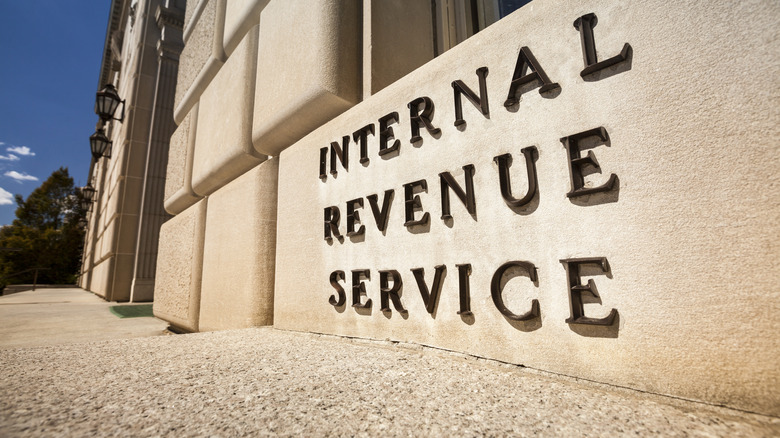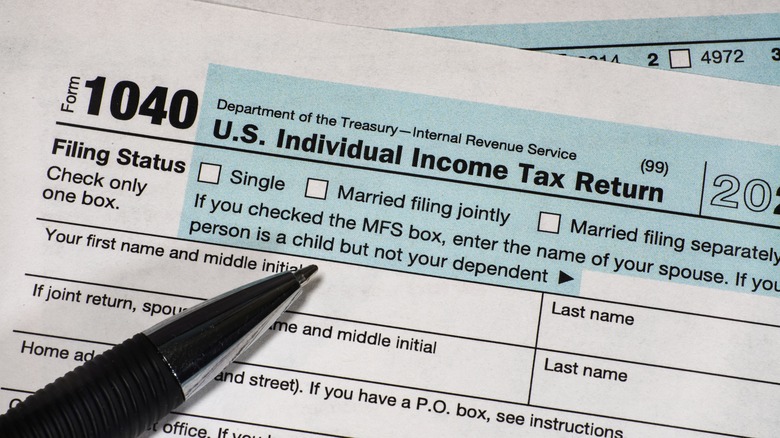Myths About Taxes You Need To Stop Believing
Taxes are an irrefutable part of life. Benjamin Franklin's assertion that taxes and death are the only two certainties in this world is a well-known adage on a much-maligned topic. But almost equally understood are a variety of misnomers and myths that create a damaging swirl of misinformation about what taxpayers can and can't do each year when this accounting period comes around once again. It seems that for every tax time reality at play, there may be an equal or even greater number of factual inaccuracies that taxpayers have come to internalize as true features of the American taxation system.
Many people think that the wealthy can legally evade taxes every year. Conversely, it's often thought that some of the lowest earners in the country are destined to overpay on their taxes and even have to pay for the privilege of filing with the IRS every year. On all fronts, tax time is rife with misunderstanding and a variety of myths that have made their way into popular culture. Understanding where these factual inaccuracies lie can help you make the most of your tax preparation. From finding ways to maximize your tax refund to utilizing additional tax breaks, credits, and deductions to reduce your burden on the whole, every taxpayer in America must get their head wrapped around the realities of tax season in order to avoid fictions that can lead to heartache.
Students don't have to pay taxes
One common misconception surrounds the classification of individuals exempt from paying taxes. Many people incorrectly assume that they don't need to pay taxes because they are students. Whether in high school or college, the designation of "student" doesn't exclude you from having to file and pay taxes. This myth likely came about from the other demographic features that often characterize students. Anyone under the age of 65 who earns at least $13,850 (the figure for 2023's reporting) must file a tax return. Anyone who earns money pays taxes, but filing is only required once this threshold is met. Students under the age of 15 or 16 often don't work, or don't reach that threshold, and therefore have no income that must be declared. College students and older high school attendees may also be focused on their education and therefore not leverage their free time in the workplace.
Another wrinkle that features in this misunderstanding is the fact that dependents who are listed on a parent's tax return also won't be filing with the IRS. However, a dependent can work in a part-time job and pay taxes that come out of their paycheck. There are some overlapping features here, but the heart of the matter is that older students tend to fall into a transitional space between part-time work and dependency, and full-blown workplace and taxpayer responsibility. Some students will need to file taxes, but all students who work must pay them.
'I won't get audited because I don't make enough'
Another common myth suggests that the IRS only targets high earners when conducting audits. The prevailing thinking here is that middle- or low-income earners simply won't ever be audited because it perhaps isn't worth the IRS's time and resources to chase down a small fish. This type of thinking can lead to malfeasance when it comes time to report income and additional financial information like earnings in the stock market or other asset appreciation. The truth is that 1% of all taxpayers will get audited, regardless of income or any other factor at play in their financial circumstances. A higher income may yield the larger potential to be audited but anyone can be targeted for additional scrutiny, particularly if their math doesn't seem to add up.
As a result, this line of thinking can be severely dangerous. Indeed, someone convinced that they can't be audited is incentivized to attempt to cheat on their taxes to minimize the amount owed or maximize a tax refund check. It's important to understand that anyone can be audited and that misrepresenting income or other features of your financial circumstances can lead to significant penalties or even criminal liability in the future.
Money made illegally is immune from tax reporting
Speaking of illegal activity, it's tempting to think that money made illegally isn't subject to the IRS's grip. Most people won't be in a situation where they have to determine what to do with income earned illegally, but for those who are this status can lead to a secondary set of criminal liabilities.
As a practical matter, the IRS isn't concerned with how you make your money, but rather that you report your earnings fairly and accurately. Money earned illegally is still technically subject to federal income tax, as well as state taxes if they apply in your jurisdiction. By failing to report your income, you may be on the hook for both criminal liability surrounding the activity as well as tax evasion charges that can worsen your legal woes. It might seem strange, but there's a reason why Al Capone was famously caught as a result of tax evasion rather than his string of fabled criminal activity proper. It likely wouldn't be right to offer up tax advice for those earning illicit incomes, but just note if this does apply that tax liabilities remain in effect regardless of income source.
Monetary gifts are taxable
Some people often worry about tax implications surrounding gifts given or received. The truth is that any gift you get from a friend or family member isn't taxable. Payments made for goods or services do carry a tax liability, but a gift is a different matter altogether. Regardless of the method used to transmit a gift, for instance, cash, check, or a payment service like Zelle or CashApp, gifts received don't need to be reported on your taxes. This goes for gifts of any size, too, so there's no need to worry about your tax ramifications, no matter how generous your friend or family member has been.
This is an important feature, especially for those who are nearing cutoff limits for tax credits and deduction opportunities, and it's also a welcome relief for young earners who might take home paychecks that amount to just under their reporting requirement threshold. Monetary gifts won't alter these calculations and wreck other tax planning thoughts that you are hoping to actualize.
Cryptocurrency isn't taxable because it isn't 'real' dollars
Cryptocurrency is still an evolving financial medium, and as a result many people don't understand the tax liability surrounding this digital financial asset. Because cryptocurrencies exist in a digital world, and therefore don't function in the same way that a traditional fiat currency does, they are treated like investment property regardless of the way that you might personally leverage the asset. Whether you trade cryptocurrencies as if they were stock holdings or save and spend tokens as you would dollars, any buying and selling of crypto assets you might do is classified in roughly the same way that stock exchanges operate. If you sell cryptocurrency, you'll be on the hook for capital gains assessments. Alternatively, you might think that cryptocurrency trading operates under alternative rules when it isn't done with a fiat acting as one of the pairs. The IRS maintains regulations for this, too. Whether you trade in Bitcoin and Ethereum pairs, or any other combination of large or small token assets, these exchanges are treated in the same way that a stock swap would be viewed.
Cryptocurrency legislation is continually evolving but just because these assets are still relatively young doesn't mean that the IRS hasn't outlined individual taxpayers' liabilities regarding cryptocurrency ownership and use.
The tax deadline is hard and fast
People often get confused on when the tax deadline falls and what this deadline means in a larger sense. It's commonly understood that the 15th of April is always the deadline to file your taxes. The 15th acts more as a starting point or rule of thumb, however. In 2023, the deadline to file fell on the 18th but in 2024 it returns to the 15th. The IRS says: "Your return is due on or before the 15th day of the fourth month after the close of your fiscal year [generally the 31st of December]. If your due date falls on a Saturday, Sunday, or legal holiday, the due date is moved to the next business day." For instance, in Maine and Massachusetts, filers have until April 17th to complete their tax reporting activities.
Perhaps more importantly, filers can apply for an extension without any real hassle. While there is a deadline in place, if you need more time for some reason or another, then getting an extension is a simple process that provides up to six months of leeway to help you manage this responsibility with a little more ease.
Filers have considerable leeway in determining filing status
When preparing your taxes, you may be tempted to think about whether you might pass for a different kind of filing status. Some people think that these identifiers don't matter all that much and filers can choose whatever filing status they wish. This isn't the case, and everyone must adhere to the status that best describes them. If you are married, for instance, you must complete your taxes as either a married person filing jointly or separately with very narrow exceptions (a parent married to a foreign spouse with no Social Security number, for example).
While filing status doesn't provide a great deal of leeway, some filers may be able to take advantage of the head of household designation, and married spouses can file separately if that provides a financial benefit to them. In reality, there will always be a best fit when determining filing status. Teasing this out accurately is your responsibility, whether that's a single person caring for their child or elderly parent and filing as a head of household, or a married individual deciding on whether to file jointly or not.
Filing for an extension delays payment on any taxes owed
Even with an extension in place it's important to note that any taxes you might owe the government should be paid promptly to avoid penalties and other added costs. Even if you plan to file for an extension and complete your taxes months after the initial deadline, you should get ahead of the accounting process so that you understand what your tax liability might look like. If you'll owe the government then it's important to pay at least a portion of the bill in April, even if you won't complete the paperwork.
In what might seem like a bout of cosmic irony, the government can actually charge you interest on your outstanding tax bill if you don't pay by April 31st. Therefore, it's important to get ahead of this added liability. All you need is a rough estimate to reduce or eliminate any added charges. Moreover, when you do finally return to finish your tax accounting tasks, this will be factored into the calculation. As always, if it turns out that you overpaid, the government will provide you with a refund — sans interest considerations, of course.
Separated filers can each claim the same dependent children
Married people who file their taxes jointly won't typically come into contact with this issue head-on. Each child that you brought into this world can be claimed as a dependent by a single taxpayer. When filing jointly there isn't a need to determine where to assign the child for tax purposes, but this question comes into play with spouses filing separately and couples who have separated from one another beyond their tax documents.
Generally speaking, this means that the parent with primary physical custody gets first "dibs" on the child for tax purposes — including any credits that may be due as a result of the dependent's status in the home. However, a custodial parent can allow their other half to claim the child, and for any reason that suits them. For the most part, the rules guiding how claiming children works are fairly simplistic. Married filers who are doing their taxes separately can "allocate" children in any way they see fit when it comes to claiming tax credits or expense deductions. However, as a matter of course, the IRS will begin by attaching children to the parent with the higher AGI figure when they file separately but live together.
You can claim non-working spouses or even pets as dependents
Unfortunately, loved ones that aren't actually dependents (in the legal sense) can't be claimed in this way. No matter how much you might consider your dog a part of the family — and no matter how much your pup might "depend" on you — she doesn't count when it comes time to file your taxes. Many people have lamented this fact, but the consensus seems to fall along the lines of a technical difference between human dependents and animal ones. Children who don't work don't pay taxes, but they eventually will grow into taxpaying citizens. Animals, on the other hand, won't. However, you may be able to claim some of your pet-related expenses as write-off opportunities.
Spouses also can't be claimed as dependents. No matter their employment and earnings status, your spouse doesn't count in this regard. Children and other dependent individuals that you care for — like elderly parents or a niece that you've taken in — can be claimed as dependents, but the list is cut and dry, eliminating these additional people and animal companions from consideration.
You're in for an audit if you take a home office deduction
Many tax filers have been conditioned to believe that they shouldn't claim write-offs or other credit opportunities associated with working from home. A home office setup can be a lucrative tax-slashing feature of your working arrangement, but in the past, it came with a near certainty of garnering added scrutiny from the IRS. This has led many filers to be wary of claiming home office deductions on their taxes, even as a wave of new work-from-home rules have come into play and forced millions of Americans to commute remotely to their workplace with the help of digital connectivity tools.
With the pandemic sending many Americans into a sort of physical hiding, working from home has become a routine fixture in the modern workplace. Therefore, the IRS has taken a much softer stance on those who file their taxes with home office deductions in place. However, it's important to remember that filers can't deduct expenses that come as a result of working from home anymore if they are a regular W-2 employee. Self-employed individuals retain these write-off tools, but regular office staff who remain at home cannot.
You can't file your taxes for free: So fork over the service fees
Finally, one of the most pervasive myths out there is the idea that filing your taxes has to take money out of your pocket directly. With so many tax preparation services in operation these days, it can be difficult to cut through the noise and realize that it's entirely possible to file your taxes for free. Many millions of Americans opt to purchase tax preparation software or work with professionals in the industry to streamline the process and make it a little simpler to understand. But this isn't something that you must do to complete your paperwork with the IRS.
Indeed, the IRS offers a list of services that partner with the federal body to offer free filing avenues. There are some basic eligibility criteria in place — often revolving around AGI figures and stipulating that filers be U.S. residents rather than living abroad (but not all). Finding one that will work for you is typically fairly easy and can make filing even more financially beneficial.












